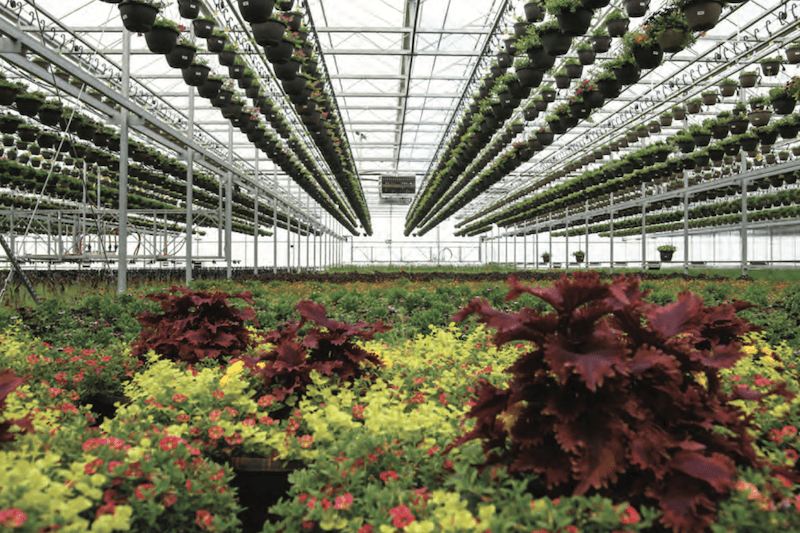
Cover Story — Perfectly Packaged & Poised to Perform
Like many greenhouse growers across the country, Dutch Heritage Gardens has family roots that go back multiple generations. Owned and founded by Aaron Van Wingerden, the property was originally purchased by his father, Arie.
The story is a unique one. Aaron was a teenager at the time, and the family was living in Pennsylvania and operating a greenhouse near Philadelphia. According to Aaron, his parents were vacationing in Colorado and got lost on a back road trying to find their way back into town.
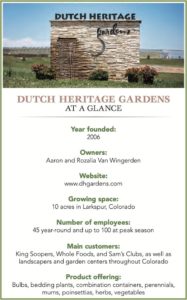 They came across a property with a large realtor sign and decided to call the number to ask for help guiding them back into town. While the realtor helped them find their way, he asked if they would like to take a look at the property for sale, which was an 800-acre parcel in Larkspur, Colorado.
They came across a property with a large realtor sign and decided to call the number to ask for help guiding them back into town. While the realtor helped them find their way, he asked if they would like to take a look at the property for sale, which was an 800-acre parcel in Larkspur, Colorado.
“They fell in love and bought it,” says Aaron. “They came back from vacation, told the family that we’re selling the business here in Pennsylvania, we’re going to move to Colorado and retire.”
Eighteen months later, the family was in Colorado. Arie retired, but couldn’t sit still for too long. A year went by before he built a three- acre range that is now Dutch Heritage Gardens.
Before becoming Dutch Heritage, however, Arie built a greenhouse and called it Cherry Creek Growers. At the age of 15, Aaron was running a night shift crew made up of college kids. “I loved it,” Aaron shares. “I had a knack for managing and for growing plants. I had a passion for it and loved managing crews of people.”
Fast forward a few years, Arie partnered with local grower Mitch McDonald to create a new company called Rocky Mountain Growers. At 21, Aaron was working as a general manager with the company when he decided he wanted to branch out and do his own thing. He moved to Ohio and worked as a greenhouse general manager for a few years.
During Aaron’s time in Ohio, Rocky Mountain Growers was sold to Color Star Growers, as Arie wanted to focus more on his 80 acre hydroponic tomato company: Sunblest Farms. However, Arie knew his son wanted to run his own company and asked Aaron if he would like to return to Colorado and purchase the original facility he built on the 800-acre parcel in Larkspur, as it had not been part of the sale to Color Star.
So, in 2006, Aaron and his wife Rozalia moved to Colorado, purchased the building and property, and Dutch Heritage Gardens was born.
Target market and strategy
From day one, Aaron and Rozalia — who are 50/50 owners of the company — shared a vision and knew they wanted to differentiate themselves from the big box market. Rozalia, too, has a background in horticulture. Born in Bulgaria, she was a horticulture major working in the United States on a school program, which brought her to Rocky Mountain Growers where she met Aaron. She had a keen eye for color and design, he says.
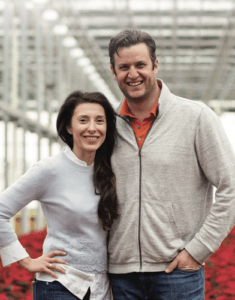
“We had both seen challenges from growers selling to big box stores … and we didn’t want to go that route,” says Aaron. “Our vision was to go after the grocery store market. They have foot traffic, but no one goes there to plan their garden out. They go to buy milk, bread and eggs.”
He and Rozalia asked themselves, “What can we offer them that’s different than what they could get at a big box store?” And that is how they came up with their claim to fame. They created a whole lineup of container gardens, which they call instant gardens, that appealed to the do-it-for-me generation.
“They don’t have time to get their hands dirty in the garden and take something from a four-pack and cultivate it for the next three or four months until it grows into a beautiful flower,” Aaron says. “We were going after the younger generation with ‘impulse buy’ items, so they could purchase an instant container that has different colors and textures of plants, and put it out on their front porch or the balcony of their apartment.”
As marketing and brand manager, Rozalia put together 30 to 40 different recipes and paired them with decorative containers. They put the recipes in the back of their van and pitched them to the local grocery chains. At the time, Aaron says, everybody was using black, white, terra cotta or green plastic. That was the norm, and they wanted to offer something fresh with instant appeal — the whole package.
The buyer for the King Soopers chain (owned by parent company Kroger) was particularly impressed, and immediately placed an order. “We built a production model to service their [153] stores with the different combinations he liked, and we did the same thing with Albertsons, another grocery chain at the time. So that was 2 million customers right out the gate.”
After a few years, King Soopers — happy with the partnership and the product quality — asked Aaron if he would like to have 100% of their outdoor offerings, which included hanging baskets, gallon perennials, zonal geraniums, etc. There was just one caveat; Dutch Heritage could no long service competing grocery chains. Aaron made the deal, and they went from $800,000 in King Soopers sales that year to $3.5 million the following year. Today their business has grown to over $10 million with King Soopers.
“The business has grown exponentially together,” says Aaron. “We formed a very good partnership. I don’t think there’s many growers that can deliver two times a week to 150 locations like we do. We built our logistics and how we service the stores, so they get fresh material twice a week, and it’s done really well for us.”
Today, Dutch Heritage also services Whole Foods throughout Colorado. “Even though Whole Foods is a grocery chain, they’re a little bit different of a segment and there was no pushback from King Soopers,” says Aaron.
And while it may sound contradictory to his original vision, Dutch Heritage also services the Colorado Sam’s Club locations. “Sam’s Club is pretty unique in that they want product delivered on Thursday, and if it doesn’t sell
by Sunday night, they throw it away. So our container gardens line up perfectly with that model. If it’s not selling, then we know we need to phase out of that recipe.”
He says it’s been a good relationship because they are really fast in and fast out. “They want to start Mother’s Day and be done by Father’s Day, so it’s really like a five-week program with them.”
Seed to shelf to garden
According to Aaron, it is very important to have a personal connection with their customers. He says the buyers from both King Soopers and Whole Foods visit the operation often and walk through the greenhouses.
“Every three or four years, we hold a flower summit where we bus in all the floral managers from all the King Sooper stores, and have an entire training day,” explains Aaron. “Turnover at these stores is sometimes high, or they rotate positions and someone from the deli is now at the flower shop.
“We bring all 150 managers out here with the buyers, we give them a whole tour of the greenhouse, explain how long it takes from seed to shelf, and then we have workshops where we show them how to water, how to deadhead, what’s a good plant, what’s a dead plant, when to mark down, etc. And that has really helped keep our sales relationship and the sales themselves strong.”
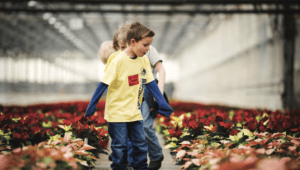
Aaron says it takes four or five months just to create a beautiful plant. And all its takes is four or five hours in the wrong hands for all of that to be destroyed.
Because of the delicate nature of plants, and the constant care they require, Dutch Heritage not only markets to its direct customer but to the end consumer as well.
“We don’t want to be a nameless, faceless grower,” Aaron proclaims. “We want people to know where they’re getting the product and who we are when they pick up that zonal geranium or that combo. And the flower managers are an extension of who we are at these stores, so it’s important to get everybody on the same team and taking the same mindset.”
Dutch Heritage has created its own logo, which appears on about 80% of all their products. They also have a couple of sub-brands, such as their Impressions line, which is their container combos; Culinary Essence, which is their herb program; and Bee Wilder, which is made up of combinations that attract pollinators.
“We just want to ensure that the consumer is proud of buying our material,” says Aaron. “And because it’s grown in Colorado, we push really hard that it’s locally grown. We have a very unique climate here, and we want people to know we take pride and care in what we offer. We love plants, and we love that you love plants too.”
Investing in technology
Creating the perfect package requires not just the right team but also the right equipment. And the Van Wingerdens have continuously made investments in their structures and equipment to ensure efficiency.
The greenhouses are all Dutch-style, half are tempered glass and the other half are double poly. They have heated concrete floors, a combination of hot water boilers and unit heaters, irrigation booms, and ebb and flood floors.
Their propagation house has seen the most recent investment, which is a dry fog system out of Japan. “It basically takes air and water and combines them in such a way that the water molecule is at such a nano particle that it is no longer a droplet when it is dispensed,” Aaron explains.
“Most misting systems get everything wet; and we’ve got booms, high-pressure sodium lights, blackout curtains, a lot of electronics. So for our propagation houses, I’m trying to find a way to get higher humidity because in Colorado we have very low humidity and lots of sunlight. It can be a very harsh environment to grow plugs. This technology can raise the humidity to about 80% without getting anything wet.”
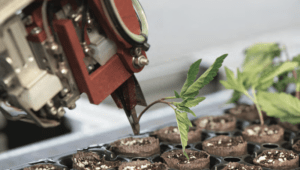
Dutch Heritage Gardens also invested in cutting robots three years ago, and Aaron jokes he should have made that investment 10 years ago. “It paid for itself right away,” he says.
For perspective, he says they plant 99% of all their cuttings now using the robots. They used to have a 15-person sticking line. “One really good person can do 400 cuttings in an hour, and one robot — and we have two of them — can do about 2,200 cuttings per hour. So, it was a very quick payoff.
Aaron says being automated is very important for their business model. Labor is rare and hard to find, and there is often turnover in greenhouse work. “It is a very physical job with lots of repetitive movement, so it can be difficult to find people who enjoy that type of work. Lots of people enjoy plants but working in a greenhouse is very different.”
Keeping up with trends
As houseplants continue to rise in popularity at the consumer level, Dutch Heritage Gardens has definitely taken notice and plans to create their own niche in the market segment.
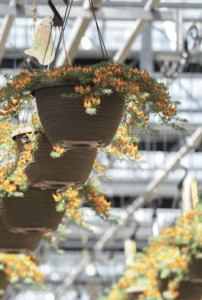 “I know it’s a trend that’s been building up steam, and King Soopers came to us and said this was something they wanted to do as well,” says Aaron. “And because of our propagation zones with the fogging systems, it’s something that we can now tackle.”
“I know it’s a trend that’s been building up steam, and King Soopers came to us and said this was something they wanted to do as well,” says Aaron. “And because of our propagation zones with the fogging systems, it’s something that we can now tackle.”
In the last year, he says they have brought in 200 different kinds of tropical foliage plants and have planted them in various sizes to monitor how they grow. “I think we have identified 30 to 40 varieties that we want to roll out next year.”
The goal is to roll out the program in 2022, where they will be able to supply stores consistently. Beyond that, the goal is to offer up truly unique and different varieties. “I don’t want to grow anything that you can get from Florida. They fill a need. For us, we want to grow unique, or rare, items that may not ship as well.”
And Rozalia, he says, is probably the most excited of all to take on this new endeavor. She is a houseplant lover as well, and has turned their home into a trial garden. “I’ve got 150 houseplants in my home right now!”
Jasmina Dolce is managing editor of GPN magazine. She can be reached at jdolce@greatamericanpublish.com.


 Video Library
Video Library 




















